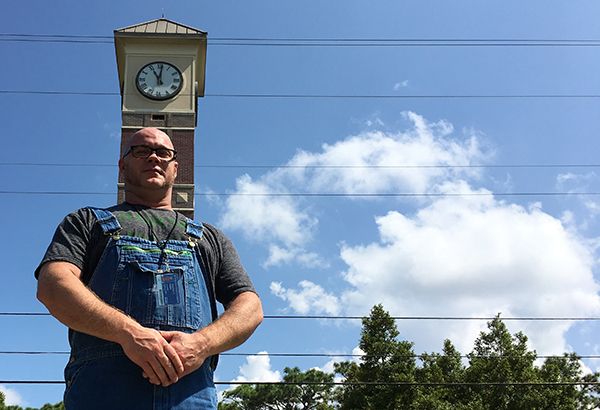After Pensacola State College drops Collegiate High, GED and ESOL are the priorities for the Adult Education Program
By Troy Moon, Pensacola State College
Stephen Walls cooks under the name “Walls Clay” – look him up on Facebook – and makes what he boasts is “Florida’s Biggest Food.” On Saturday, he’s serving up a 10-foot burrito to a local fire department and a couple nonprofit groups. On Wednesday, he cooked chicken on a Rolls Royce 501-D13 engine he’s converted into a smoker/grill.
But it’s not just big food Walls has cooking. He’s also has big dreams. One of them is moving from the south side of the Pensacola State College Pensacola campus to the north side.
Yep, he wants to – let’s play on the PSC slogan – GED here, go there.
Walls, a 41-year-old single father, just started GED classes at Pensacola State this month. He admitted to a wild youth and dropped out in ninth grade.
Now he’s back in school.
“I’m proud of what I’m doing,” said Walls, who is also known for his normal-sized, mouth-teasing culinary concoctions that he posts on Facebook and YouTube. “It’s not easy going back after all this time. My daughter (9-year-old Angela) is excited for me. We’ll be doing our homework together.”
Walls’ story is a familiar one for the College’s Adult Education Program, which offers GED preparation and training.
In fact, that’s the main priority of the Adult Education Program, which formerly included Collegiate High School. But high school classes ended in August for the college.
Now, the Adult Education Program, located at the Raymond B. and Leila Hobbs Center for Teaching Excellence (Building 11), is focusing on the other two aspects of its mission: GED preparation and offering English for Speakers of Other Language (ESOL) classes.
“We’re still offering the same programs and opportunities, except for the Collegiate High School,” said Joseph Kyle, Pensacola State’s Adult Education Program department head. “A majority of our (290 Adult Education Program) students are GED students. But ESOL is growing, and we’re getting more interest in the program. We have retired military veterans married to foreign students who come here to improve or learn to speak English.”
Brenda Kelly, the college’s senior dean of academic affairs, said dwindling enrollment was a major factor in dropping Collegiate High School, which had previously been known as Adult High School. High school classes were first offered at then-Pensacola Junior College in 1964.
“When we first started the high school, it was the only option to traditional schools,” Kelly said. “Now, there’s a lot of competition and alternatives. Enrollment (at PSC Collegiate High) had plummeted.”
Now the aim is to best prepare students who don’t have a high school diploma, but also don’t want to enroll in a structured, traditional high school program, she explained.
“We’re really focused on helping students prepare for the GED,” Kelly said. “In high school it’s very structured, and you have a certain amount of time that is required. But with the GED, if students are motivated, they can come here, get prepped and get ready for the next stages of their lives.”
Walls is one of those students. And when he passes his GED exam, he hopes to enroll in classes at Pensacola State.
“I want to go from this side,” he said while standing near the Adult Education Program building on the south side of College Boulevard, “to that side.”
“That side,” on the north side of the Pensacola campus, is where the College’s Culinary Arts Program is located.
“I want to start culinary school and learn what I need to learn,” said the talented cook, who spent years working in the aviation business while raising his daughter on his own. “I’m doing now what I should have done 20 years ago.”
Walls knows it won’t be easy.
“I’ve got a lot to learn,” said Walls, easily recognized by his ever-present denim overalls, which have become sort of his trademark. “Basic math and grammar. But I never quit learning. I just need that formal education.”
Marge Sowa, an associate professor and Adult Education Program coordinator, knows that GED students face a tougher road than those studying for the battery of tests a decade or so ago.
An example, Sowa noted, is the Reasoning Through Language Arts portion of the GED test.
Before changes were made nationally to the GED program in 2014, one of the questions for the Language Arts essay portion was “Who’s your hero in your life?”
Today, a sample essay question has students read both pro-and-con sides of a stated argument and then write an analytical essay to support one of the arguments.
Math?
Sowa pulls out a GED math sheet where students are asked to find the “Slope and Y-intercept for each equation.” It’s a long way from “How many quarters make up $10?”
“A GED is not what everyone thinks,” Sowa said, referring to the long-standing stereotypes about what a GED is and what it can do for a person. “It’s not the same as it used to be. It’s more difficult now because more is expected. We’re preparing them for career and college readiness. We didn’t do that before.”
For more details on GED, ESOL and other Adult Education Program services at Pensacola State College, go to www.pensacolastate.edu or call 850-484-2120.

 PirateQ
PirateQ 
